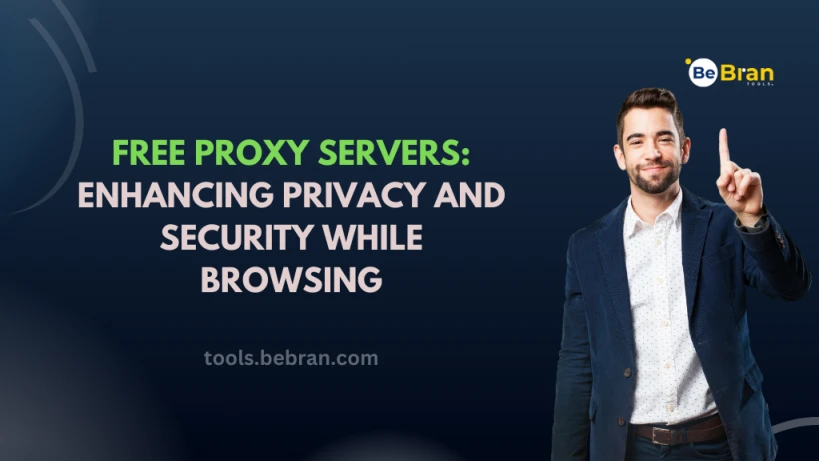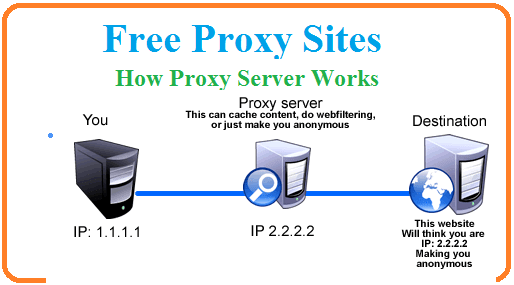
Free Proxy Servers: Enhancing Privacy and Security While Browsing
In an era where digital privacy and security are paramount, free proxy servers have emerged as a vital tool for internet users. These servers act as intermediaries between a user's device and the internet, offering a layer of anonymity and security while browsing. This article explores how free proxy servers enhance privacy and security, their advantages, potential drawbacks, and how to effectively utilize them.
Understanding Proxy Servers

A proxy server is a computer that acts as a gateway between your device and the internet. When you use a proxy server, your internet traffic is routed through it, masking your IP address. This process not only anonymizes your online presence but also can bypass geo-restrictions or filters set by governments or organizations.
Free Tools: Free Rewrite Article Tool Online | Free Small Text Generator Tool Online | Free Image to Text Converter Tool Online
Enhancing Privacy with Proxy Servers
Privacy is a major concern in the online world. Every website you visit, every search you perform, is often tracked and logged. By using a proxy server, you can hide your IP address, making it difficult for websites and trackers to identify you. This anonymity is particularly useful for journalists, activists, or anyone concerned about their online privacy.
Security Benefits
Free proxy servers can provide an added layer of security. They can act as a buffer between your device and potentially harmful websites. By filtering out malicious content or websites, they help protect your device from cyber threats like malware or phishing attacks.
Overcoming Geo-Restrictions
One of the most popular uses of proxy servers is to bypass geo-restrictions. This is particularly useful for accessing content restricted in your country or for bypassing censorship. Proxies can make it appear as if you are browsing from a different location, allowing access to region-locked content.
The Drawbacks of Free Proxies
While free proxy servers offer many benefits, there are drawbacks. Since they are free, they often have a high volume of users, which can lead to slow connection speeds. Additionally, not all free proxies offer encryption, which is crucial for protecting the data that passes through them. Users must be cautious and select trustworthy proxy services to avoid security risks.
Choosing the Right Proxy Server
When selecting a proxy server, consider factors like speed, security features, and the level of anonymity it provides. Look for proxies that use SSL encryption to secure your data. Also, consider the server location, as this can impact both speed and access to geo-restricted content.
Setting Up a Proxy Server
Setting up a proxy is relatively straightforward. Most operating systems and browsers allow users to configure proxy settings. The process involves entering the proxy server's IP address and port number into your browser's settings. Some browsers offer extensions or add-ons for easy proxy setup.
Potential Legal and Ethical Considerations
While using a proxy server is legal in most countries, it’s important to use them ethically. Bypassing geo-restrictions to access copyrighted content, for example, may violate terms of service agreements. It’s essential to be aware of and respect the legal and ethical implications of using proxies.
Conclusion
Free proxy servers are a valuable tool for enhancing privacy and security online. They provide a means to browse anonymously, protect against security threats, and access restricted content. However, users must be aware of their limitations and choose a reliable proxy service to ensure the best experience. As the digital landscape evolves, understanding and utilizing tools like proxy servers will become increasingly important in safeguarding our online presence.
Also Read: The Impact of App Ranking Trackers on User Acquisition and Retention Strategies | Enhancing Online Security: Understanding the Role of Credit Card Validators
Frequently Asked Questions
- What is a free proxy server?
A free proxy server acts as an intermediary between your device and the internet, masking your IP address to provide anonymity and potentially bypass geographical restrictions. - How do free proxy servers enhance online privacy?
By hiding your real IP address, proxy servers make it harder for websites to track your location and browsing habits, thereby enhancing your privacy. - Are free proxy servers safe to use?
While they can provide a basic level of anonymity, free proxy servers are not always secure. It's essential to use reputable services to avoid compromising your data. - Can proxy servers encrypt my data?
Standard proxy servers do not encrypt data; they only mask your IP address. For encryption, consider using a VPN service. - Do proxy servers speed up internet browsing?
Sometimes. Proxy servers can cache popular websites, leading to faster load times, but they can also slow down your connection due to additional data routing. - Can I access geo-restricted content with a free proxy?
Yes, proxies can bypass geo-restrictions by making it appear as if you are accessing content from a different location. - How do I set up a free proxy server?
Setting up a proxy involves configuring your browser or device to route traffic through the proxy server. This setup varies depending on the device and browser. - Are there any risks associated with using free proxy servers?
Free proxies can pose risks such as exposure to malware, unencrypted connections, and potential logging of your browsing activities. - Can I use a proxy server on all devices?
Most devices that connect to the internet, including smartphones, tablets, and computers, can be configured to use proxy servers. - How do proxy servers differ from VPNs?
While both mask your IP address, VPNs offer more comprehensive security features, including end-to-end encryption, which most proxy servers do not provide.



